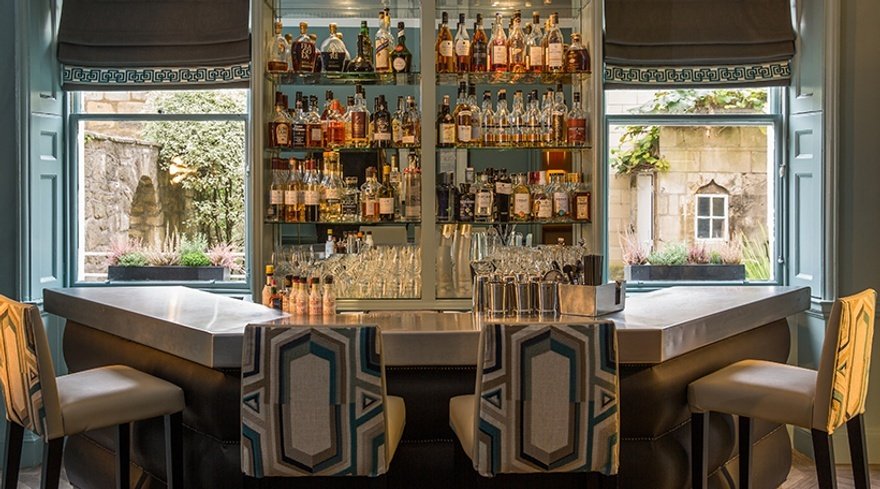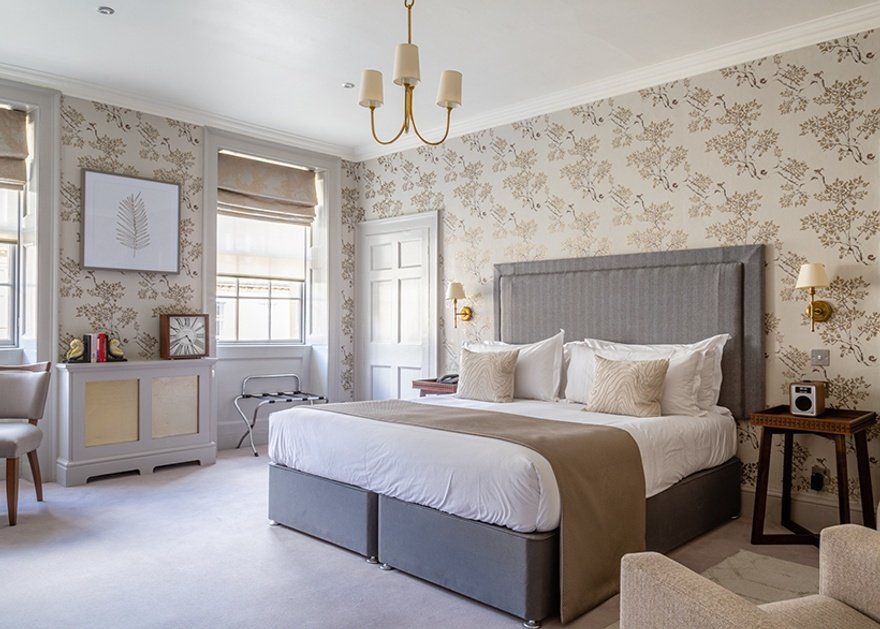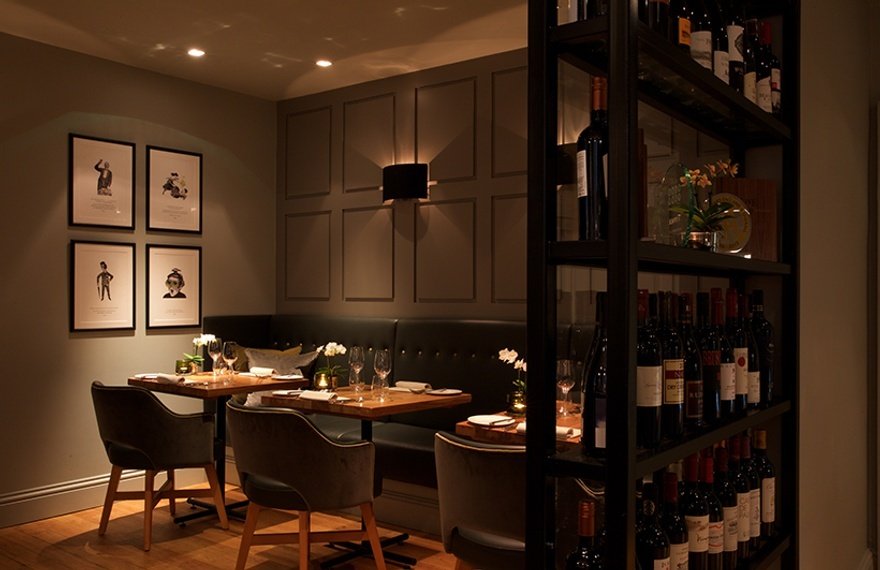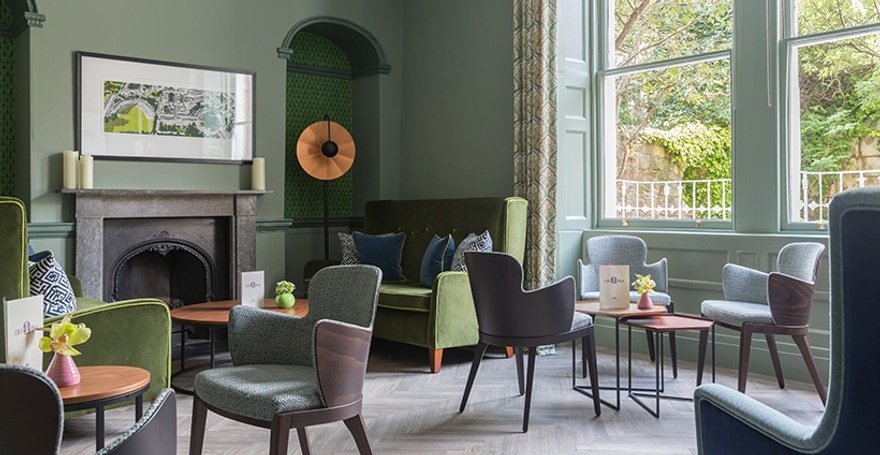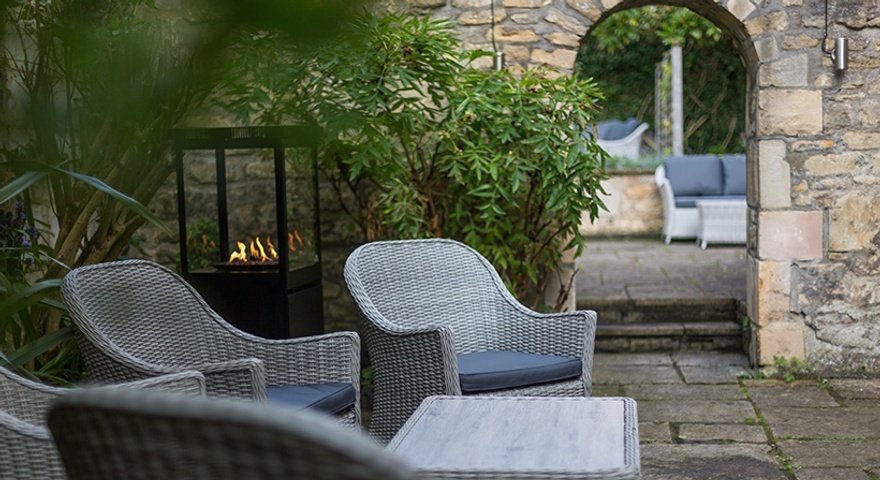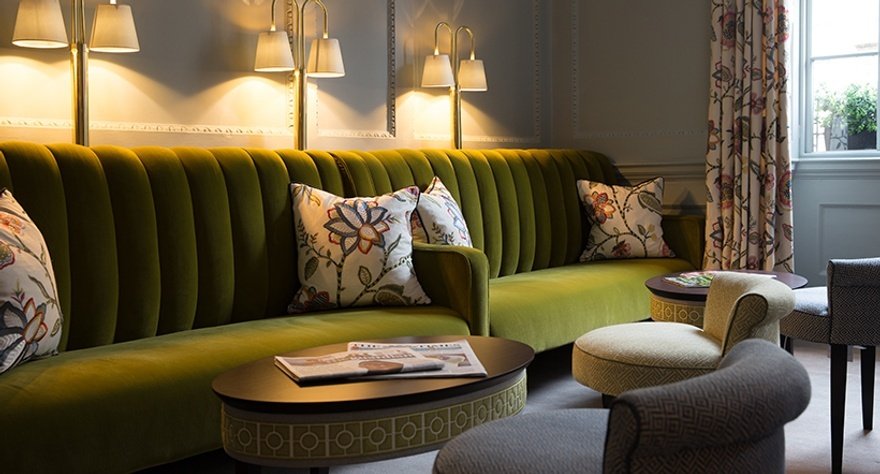Alongside suffering the fallout from the Covid-19 crisis, the Queensberry hotel in Bath has endured a devastating fire and a positive diagnosis of the virus for its owners. Laurence Beere shares the hotel's journey of resilience over the past seven months with Janet Harmer.
After 16 years of building up the Queensberry hotel to become one of the leading boutique offers in Bath, Laurence and Helen Beere felt able to relax and enjoy running the four-AA-star, 29-bedroom business. In 2019 the Grade II-listed, Georgian property had just completed a £1.3m refurbishment programme, while business was booming at its Olive Tree restaurant following the award of a Michelin star the previous year.
"We were on top of things, cash flow was in the best shape and our three children were grown up, so our personal overheads were improving," says Laurence Beere. "Helen and I were enjoying our business without the immense worries and pressures that had gone before."
Then, of course, Covid-19 happened and, like every other hospitality operation in the country, the Queensberry was knocked for six. But there was more to come. Just four and a half hours after the Beeres closed the hotel on 22 March, a day ahead of the announcement of a national lockdown, a fire caused £500,000 worth of damage at the property. And then, six months later, the couple themselves diagnosed positive for Covid-19, delaying the planned opening of the Olive Tree restaurant for two weeks.
Recalling the 14 days leading up to the closure, Beere lays bare the trauma of that time: "Bookings were cancelled and revenue coming into the business stopped overnight, but we still had overheads to settle, including payroll. It was very scary.
"We have had many challenges since taking over the hotel in 2003, including the 2008 banking crisis, when we got caught up in interest rate hedging problems. But this time I genuinely thought we were going to lose everything. We had gone from a positive cash flow position to a point where we were going to need a £150,000 overdraft in a matter of weeks."
A meeting with the Queensberry's bank manager threw the Beeres a cash lifeline. "Our experience of banks in the past was not good, with no support when times had previously been tough. But we had recently moved to Barclays and completed a refinancing of our senior debt on 28 February. We were told that Barclays liked our business and was going to continue supporting us."
Following the announcement by the chancellor Rishi Sunak on 23 March of the Coronavirus Business Interruption Loan Scheme (CBILS) to help small- and medium-sized businesses, the Queensberry became the first to draw down such a facility via Barclays.
"The bank had the confidence in our business and our ability to service an additional £450,000 debt on top of our existing £3.8m facility. The amount was granted on the basis that we would be closed until October, after which we would possibly reopen with a nominal income."
Despite knowing the bank was behind them, the final days prior to closure were tough, with virtually no business exacerbated by a number of nasty phone calls demanding instant refunds on non-refundable, non-amendable reservations. "It was devastating for the team," says Beere. "But, equally, we had some very supportive people getting in touch saying they would support us when we reopened. It is the ying and yang of human nature."
Up in flames
After saying goodbye to the final guests on 22 March, Beere returned home and closed his eyes, the pressure and exhaustion of the previous weeks finally catching up with him. Two hours later he was awoken to be told that the hotel was on fire.
The forensic investigation that followed found an extractor fan that had been replaced a few months earlier had not been wired correctly, causing arcing across the connections. The wooden cladding on the extract ducting at the back of the hotel went up in flames, resulting in burning material falling into the basement, causing a secondary fire that destroyed the kitchen.
And so began the long process of dealing with the insurance company, which assured Beere that the hotel's reinstatement policy would pay out, followed by the redesign of the kitchen. "Our chef Chris Cleghorn was fantastic. Together we worked out every element of what had been destroyed to put to the loss adjustors and set about the refurbishment."
The process of rebuilding was the closest Beere says he has come to experiencing depression, despite enduring major traumas in his personal life, including the death of his daughter Isabel 22 years earlier and then being told that her twin, Alice, was unlikely to see her second birthday. Although Alice suffers from a complicated medical condition and has endured a bone-marrow transplant, she is still here today.
"Dealing with the aftermath of the fire was very isolating as so many people were furloughed, but I am hugely grateful to Helen for being my rock and ensuring I was fed and watered at the end of each day, and my amazing management team – Chris, Joss Roussann and Owen Farr – for supporting us.
"There has been a lot of talk around mental health, especially during the past six months. Our industry is about caring and hospitality – we look after our guests and we look after each other in our team. What we went through was awful in every sense of the word, but our team is now closer, having learned a lot about each other during this shared experience."
What we went through was awful in every sense of the word, but our team is now closer, having learned a lot about each other during this shared experience
Back to the new normal
The doors of the Queensberry eventually reopened to guests on 1 August as a bed and breakfast, due to the kitchen still being out of action. Initially, only a skeleton staff was brought back from furlough, as occupancy was forecast at around 20%-25%. However, within five days bookings came flooding in, with occupancy eventually settling at 81% and 80% in August and September respectively, dropping back to 74% in October.
"We were slightly down on our normal summer occupancy of the low 90s, but we far exceeded our expectations, which meant we were able to bring more people back to work, which is what everyone wanted."
Pre-Covid, the hotel employed 45 staff. Today the number is 40, with the five no longer with the team having left in the interim of their own accord. No one has been made redundant and there are no plans for anyone to lose their jobs.
"We are being much more flexible now," explains Beere. "That is how we had to operate as a B&B, with everyone involved in everything, from chefs working in housekeeping to reception staff doing room service. If anyone tests positive for Covid, that person will have to isolate and other members of the team will have to step in. Everyone is happy to do that as everyone is happy to be back at work."
The need for the team to be supportive is an extension of the way the Beeres have always aimed to run the Queensberry – in an empathetic, anti-corporate manner. "Anyone looking closely at the way we run the business might say we don't run it very well because we don't necessarily have strict procedures. But what we do have is a value standard, which is all about caring for one another. If a member of the team is having personal issues, Helen and I are here to support them.
"We are both here every day and we will do everything we need to do to ensure the team is OK. When staff shortages were a massive issue, and Chris was still finding his way as head chef and trying to drive up standards, I put my whites back on and became his commis to help take the pressure off. That kind of support goes a long way among the team."
Disaster strikes again
The opening of the Olive Tree was initially set for 1 October. Six days earlier the kitchen was handed back to the hotel by the builders and the team were gearing up for the launch. However, that evening, Beere started to cough and, following official advice, drove to Cardiff for a Covid test.
"The result was positive and so we immediately isolated the senior management team and pushed back the restaurant opening by two weeks," he says. "We had been fully booked and as a result the delay cost us £35,000 in lost business."
While not suffering extreme symptoms, Beere did experience extensive fatigue and spent 10 days in bed. Meanwhile, Helen and Alice also tested positive. "Alice catching Covid was bloody terrifying, as chronic lung disease is one of her long-term challenges and she had originally spent 18 weeks shielding. But, the virus didn't go to her lungs and instead attacked her gut. She has now come out the other side and is back at college.
"Thankfully, we've all come through it. I'm not going to do a Donald Trump and say don't be afraid of the virus – I say do be afraid, it's a nightmare. Somehow we remained positive and focused on overcoming it and moving forward."
Beere knows that he caught Covid by attending a meeting at an external office. "I think the reality is that if I had stayed in the hotel, I would have been far safer. The hospitality sector is so much better at cleaning, and we have elevated our normal practices to create a Covid-secure environment. The government's attitude toward blaming hospitality for the spread of Covid makes me very cross."
The Olive Tree finally opened on 13 October and has been virtually full every evening since, as well as during the three lunch sittings it operates from Friday to Sunday.
Pre-Covid, the restaurant would serve around 50 covers on Friday and Saturday evenings and around 25-28 during the other nights of the week. Now, with social distancing in place, the maximum number of covers that can be served is around 35, which is being achieved nearly every evening of the week.
"We're now doing more consistent business at both lunch and dinner than we were doing before Covid," says Beere. The eagerness of customers to return to the Olive Tree follows on from the excellent year of business in 2019 when restaurant turnover grew by 40%, following the award of a Michelin star in October 2018. Growth in business allowed the Beeres to increase the size of the kitchen brigade, ensuring the chefs now work a maximum of 50 hours per week.
Meanwhile, average room rates have been holding up well, with the VAT reduction helping and the completion of the bedroom refurbishment last year providing greater confidence to price rooms accordingly. "Our marketing strategy has been to move our positioning up within the market. Our product is the best it has ever been and we want to be the boutique alternative to the luxury market in Bath. We are deliberately pricing ourselves as slightly more expensive than we were, and we are not getting any push back on that. Bath, like much of the south-west, has benefitted from people coming out of London and major cities to stay with us."
A budgeted room rate of £150 on reopening has been surpassed, with an average rate of £187 achieved during August and September and £195 in October, compared to £136 in October 2019. "There has been much debate as to whether hospitality companies should pass on the 15% discount in VAT to customers. But I believe the chancellor put the reduction in VAT in place to help the industry recover.
Certainly, when VAT has gone up in the past, no one was willing for us to put up our price; that is something we absorbed."
The Queensberry and the Olive Tree now appear to be back on track, but that is all supposing nothing else comes along to derail the business and, in the current world, anything is possible. With a further lockdown in place, the hotel still has the CBILS facility behind it.
"Our cash position is reasonable as we have been trading since August when we weren't expecting to," says Beere. "I would like to see the VAT and business rates reductions extended, at least for the whole of 2021. It is not just the short-term – we've also got to think about long-term recovery and we've got to consider paying back another £450,000 on top of everything else."
Beere has come to realise the importance of ensuring that debt in a business needs to be one that you can afford to service, while using money from the good times to reinvest in the operation, as well as put some aside as a reserve to recover from the hiccups life can throw at you.
"I made the mistake in the early days of being over-extended, of being over-confident. It took us a long time to get back from that. And finally, after having got it right, Covid came along. But we believe that this is a good business and – with the support of the bank –that is why we have kept fighting."
Facts and figures
The Queensberry hotel, 4-7 Russell Street, Bath BA1 2QF (01225 447928)
Owners Helen and Laurence Beere
Head chef Chris Cleghorn
Hotel manager Joss Roussanne
Restaurant manager Owen Farr
Bedrooms 29
Staff 40
Consortia Mr & Mrs Smith, Sawday's, Condé Nast Johansens
Oversupply in the Bath hotel market
Laurence Beere has long been a critic of planning decisions taken by Bath and North East Somerset Council, which have led to what he calls "a significant oversupply" of the capacity of hotel rooms in the city.
Following a study by the council of the Bath hotel market in 2015, an avalanche of new developments have been given the go-ahead. New hotels in the city include the 177-bedroom Apex City of Bath, Gainsborough Bath Spa (99 bedrooms) and the just-launched Hotel Indigo (166 bedrooms). Meanwhile, a Hampton by Hilton (209 bedrooms) from Dominvs Group and a business hotel (up to 130 bedrooms), operated under an unspecified brand within the multi-use Bath Quays North development, are under development. Plans by Singapore-based Fragrance Group to turn the Grade II*-listed Royal Mineral Water Hospital into a 167-bedroom hotel were turned down in September.
Beere says that the new supply, together with the growing presence of Airbnb, has resulted in a precarious situation for the Bath hotel market, with a lot of businesses – particularly the traditional bed and breakfast and guest house market – being badly hit. The failure of the Bath Visitor Information Centre to open after lockdown due to being "no longer economically viable" has compounded the problem.
"The common misconception is that Bath is doing well," explains Beere. "It is a popular city, but oversupplying it has destabilised the market."
The plethora of new, large hotels and disappearance of many smaller businesses has, Beere believes, provided an opportunity for the Queensberry. "With just 29 bedrooms, we are a niche, unique, boutique hotel. Everything we do is service-orientated, offering the likes of valet parking for guests' cars."
Continue reading
You need to be a premium member to view this. Subscribe from just 99p per week.
Already subscribed? Log In


